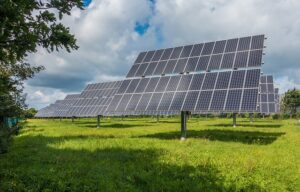From Smart Grids to Eco-Friendly Materials: The Role of Technology in Achieving Sustainability
In a world increasingly defined by environmental challenges, sustainability has never been more critical. Enter technology—a powerful ally reshaping how we interact with our planet and paving the way for a greener future. From intelligent grids that optimize energy use to innovative eco-friendly materials revolutionizing construction and manufacturing, the tech landscape is brimming with solutions designed to combat climate change and promote sustainable living. Join us as we explore the transformative role of technology in achieving sustainability, uncovering inspiring advancements and practical applications that not only promise a healthier Earth but also empower communities around the globe.
Renewable Energy Technologies
 Renewable energy technologies are at the forefront of green tech innovations, providing crucial solutions for reducing reliance on fossil fuels and decreasing greenhouse gas emissions. Solar power, wind energy, and hydropower have seen significant advancements in efficiency and cost-effectiveness. Innovations such as advanced photovoltaic cells, offshore wind turbines, and hydrokinetic systems are enhancing the capacity and reliability of renewable energy sources. Additionally, energy storage technologies, such as next-generation batteries and grid-scale energy storage systems, are improving the stability and accessibility of renewable energy, making it a viable alternative to traditional power sources.
Renewable energy technologies are at the forefront of green tech innovations, providing crucial solutions for reducing reliance on fossil fuels and decreasing greenhouse gas emissions. Solar power, wind energy, and hydropower have seen significant advancements in efficiency and cost-effectiveness. Innovations such as advanced photovoltaic cells, offshore wind turbines, and hydrokinetic systems are enhancing the capacity and reliability of renewable energy sources. Additionally, energy storage technologies, such as next-generation batteries and grid-scale energy storage systems, are improving the stability and accessibility of renewable energy, making it a viable alternative to traditional power sources.
Energy Efficiency and Smart Grids
Energy efficiency technologies are essential for reducing energy consumption and minimizing environmental impact. Smart grids represent a significant advancement in this area, leveraging digital technology to optimize the distribution and use of electricity. By integrating real-time data, predictive analytics, and automation, intelligent grids enhance the efficiency of energy delivery, reduce waste, and support the integration of renewable energy sources. Smart meters and energy management systems enable consumers and businesses to monitor and manage their energy usage more effectively, reducing energy consumption and lowering carbon footprints.
Sustainable Transportation Solutions
Transportation significantly contributes to greenhouse gas emissions, and green tech innovations address this challenge with sustainable alternatives. Electric vehicles (EVs) are leading the way in reducing personal and commercial transportation emissions. Advances in battery technology are extending the range and improving the performance of EVs, making them increasingly accessible to consumers.
Additionally, developments in autonomous vehicles and intelligent transportation systems are enhancing the efficiency of transportation networks and reducing environmental impact. Public transportation systems are also benefiting from green tech innovations, with electric and hybrid buses and improved energy-efficient rail systems, contributing to more sustainable urban mobility.
Circular Economy and Waste Management
The concept of a circular economy, which focuses on minimizing waste and maximizing resource efficiency, is gaining traction with the help of green tech innovations. Technologies such as advanced recycling systems, waste-to-energy solutions, and sustainable materials contribute to a more circular approach to production and consumption. Innovations like chemical recycling, which breaks down plastics into their base components for reuse, and anaerobic digestion, which converts organic waste into biogas, are improving waste management processes and reducing the environmental impact of waste. Additionally, digital platforms and blockchain technology enhance transparency and efficiency in waste management and recycling.
Sustainable Agriculture and Food Systems
Agriculture and food production are critical areas where green tech innovations are making a significant impact. Precision agriculture, which utilizes technologies such as drones, sensors, and data analytics, is improving the efficiency and sustainability of farming practices. Precision agriculture reduces waste and environmental impact by optimizing the use of water, fertilizers, and pesticides while increasing crop yields. Vertical and hydroponics are emerging as sustainable alternatives to traditional farming, offering space-efficient and resource-efficient methods for growing food in urban environments. Additionally, advancements in plant-based and lab-grown foods provide sustainable alternatives to animal agriculture, reducing the environmental footprint of food production.
Green Building Technologies
The construction and operation of buildings account for a substantial portion of global energy consumption and carbon emissions. Green building technologies are addressing this challenge with innovations that enhance building design and construction sustainability. Energy-efficient building materials, such as advanced insulation and reflective coatings, reduce the energy required for heating and cooling. Intelligent building systems, including automated lighting, climate control, and energy management, optimize resource use and reduce operational costs. Additionally, sustainable architecture and design principles, such as passive solar design and green roofs, contribute to developing environmentally friendly and energy-efficient buildings.
Climate Monitoring and Data Analytics
Accurate climate monitoring and data analytics are crucial for understanding and addressing environmental challenges. Advances in remote sensing technologies, such as satellites and drones, provide detailed and real-time data on environmental conditions, including air quality, deforestation, and ocean health. Data analytics and machine learning algorithms process and interpret this data, enabling more informed decision-making and policy development. By providing insights into climate patterns and trends, these technologies support efforts to mitigate and adapt to climate change, contributing to global sustainability goals.
Green tech innovations are vital in achieving sustainability goals by advancing renewable energy, improving energy efficiency, and promoting sustainable practices across various sectors. Technology is driving progress towards a more sustainable future, from renewable energy technologies and smart grids to sustainable agriculture and green building solutions. As the world continues to confront environmental challenges, embracing and advancing green tech will be essential for fostering environmental stewardship and achieving long-term sustainability objectives. By leveraging these innovations, we can work towards a healthier planet and a more sustainable way of life.
